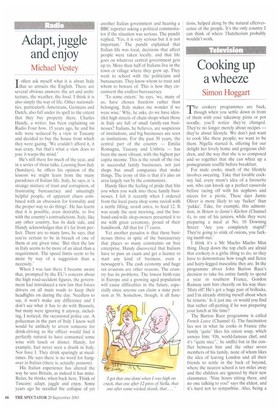Adapt, juggle and enjoy
Michael Vestey
T often ask myself what it is about Italy
that so attracts the English. There are several obvious answers: the art and architecture, the weather, the food. I think it is also simply the way of life. Other nationalities, particularly Americans, Germans and Dutch, also fall under its spell to the extent that they buy property there. Charles Handy, a writer, has been explaining on Radio Four how, 15 years ago, he and his wife were seduced by a view in Tuscany and decided to buy the house from which they were gazing. 'We couldn't afford it, it was crazy, but that's what a view does to you: it warps the mind.'
He's still there for much of the year, and in a series of three talks, Learning from Ita6i (Sundays), he offers his opinion of the lessons we might learn from the many paradoxes of Italian life. Italy, he says, is 'a strange mixture of trust and corruption, of frustrating bureaucracy and amazingly helpful people, of apparent chaos combined with an obsession for formality and the proper way to do things'. He has learnt that it is possible, even desirable, to live with the country's contradictions. Italy, like any other country, has its dark side, and Handy acknowledges that it's far from perfect. There are so many laws, he says, that you're certain to be in breach of one of them at any given time. 'But then the law in Italy seems to be more of an ideal than a requirement. The speed limits seem to be more by way of a suggestion than a necessity.'
When I was last there I became aware that, prompted by the EU's concern about the high road-accident figures, the government had introduced a new law that forces drivers on all main roads to keep their headlights on during the day. Needless to say, it won't make any difference and I don't see what it has to do with Brussels, but many were ignoring it anyway, including, I noticed, the occasional police car. A policeman in the part of Italy I know well would be unlikely to arrest someone for drink-driving as the officer would find it perfectly natural to have consumed some wine with lunch or dinner. Handy, for example, had never seen a drunk in Italy. Nor have I. They drink sparingly at mealtimes. He says there is no word for hangover in Italian (there is, actually: postumi).
His Italian experience has altered the way he sees Britain, as indeed it has mine. Relax, he thinks, when back here. Think of Tuscany: adapt, juggle and enjoy. Some years ago he recalled the collapse of yet another Italian government and hearing a BBC reporter asking a political commentator if the situation was serious. The pundit replied, Yes, it is very serious but it is not important.' The pundit explained that Italian life was local, decisions that affect people were taken locally, and that life goes on whatever central government gets up to. More than half of Italians live in the town or village where they grew up. They went to school with the politicians and bureaucrats. They know whom to trust and whom to beware of. This is how they circumvent the endless bureaucracy.
'To some extent,' he says, 'we, many of us, have chosen freedom rather than belonging. Italy makes me wonder if we were wise.' Why, he asks, do we have identikit high streets of chain shops when those in Italy are full of small family-run businesses? Italians, he believes, are suspicious of institutions, and big businesses are seen as institutions. For the past 30 years, the central part of the country — Emilia Romagna, Tuscany and Umbria — has been the most vibrant, with the highest per capita income. This is the result of the rise in successful family businesses, not just shops but small companies that make things. The irony of this is that it's also an area largely run by the communists.
Handy likes the feeling of pride that hits you when you walk into these family businesses. I felt it recently when I ordered from the local pasta shop some ravioli with a nettle filling, ravioli ortica, to feed 12. It was ready the next morning, and the husband-and-wife shop-owners presented it to me with great ceremony, proud of their handiwork. All that for 17 euros.
Yet another paradox is that these businesses thrive in spite of the bureaucracy that places so many constraints on free enterprise. Handy discovered that Italians have to pass an exam and get a licence to start any kind of business, even a newsagent's. The cash economy and huge tax evasions are other reasons. The country has its problems. The lowest birth-rate in Europe and a growing aged population will cause difficulties in the future, especially since anyone can claim a state pension at 56. Somehow, though, it all func tions. helped along by the natural effervescence of the people. It's the only country I can think of where Thatcherism probably wouldn't work.


















































































 Previous page
Previous page